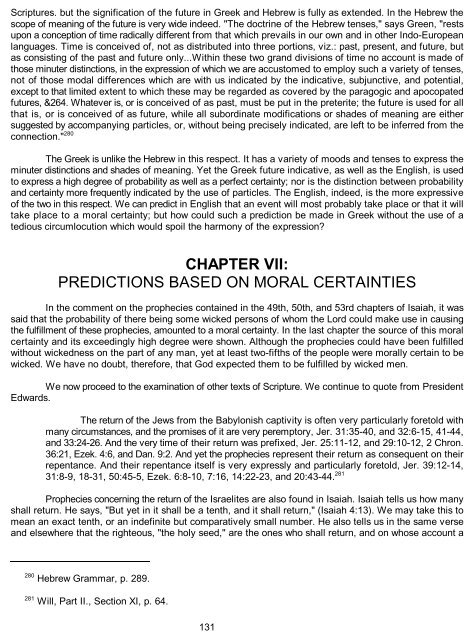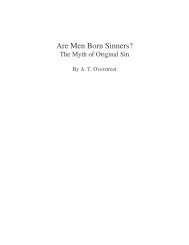Foreknowledge by Joel Hayes - Library of Theology
Foreknowledge by Joel Hayes - Library of Theology
Foreknowledge by Joel Hayes - Library of Theology
Create successful ePaper yourself
Turn your PDF publications into a flip-book with our unique Google optimized e-Paper software.
Scriptures. but the signification <strong>of</strong> the future in Greek and Hebrew is fully as extended. In the Hebrew the<br />
scope <strong>of</strong> meaning <strong>of</strong> the future is very wide indeed. "The doctrine <strong>of</strong> the Hebrew tenses," says Green, "rests<br />
upon a conception <strong>of</strong> time radically different from that which prevails in our own and in other Indo-European<br />
languages. Time is conceived <strong>of</strong>, not as distributed into three portions, viz.: past, present, and future, but<br />
as consisting <strong>of</strong> the past and future only...Within these two grand divisions <strong>of</strong> time no account is made <strong>of</strong><br />
those minuter distinctions, in the expression <strong>of</strong> which we are accustomed to employ such a variety <strong>of</strong> tenses,<br />
not <strong>of</strong> those modal differences which are with us indicated <strong>by</strong> the indicative, subjunctive, and potential,<br />
except to that limited extent to which these may be regarded as covered <strong>by</strong> the paragogic and apocopated<br />
futures, &264. Whatever is, or is conceived <strong>of</strong> as past, must be put in the preterite; the future is used for all<br />
that is, or is conceived <strong>of</strong> as future, while all subordinate modifications or shades <strong>of</strong> meaning are either<br />
suggested <strong>by</strong> accompanying particles, or, without being precisely indicated, are left to be inferred from the<br />
connection." 280<br />
The Greek is unlike the Hebrew in this respect. It has a variety <strong>of</strong> moods and tenses to express the<br />
minuter distinctions and shades <strong>of</strong> meaning. Yet the Greek future indicative, as well as the English, is used<br />
to express a high degree <strong>of</strong> probability as well as a perfect certainty; nor is the distinction between probability<br />
and certainty more frequently indicated <strong>by</strong> the use <strong>of</strong> particles. The English, indeed, is the more expressive<br />
<strong>of</strong> the two in this respect. We can predict in English that an event will most probably take place or that it will<br />
take place to a moral certainty; but how could such a prediction be made in Greek without the use <strong>of</strong> a<br />
tedious circumlocution which would spoil the harmony <strong>of</strong> the expression?<br />
280<br />
Hebrew Grammar, p. 289.<br />
281<br />
CHAPTER VII:<br />
PREDICTIONS BASED ON MORAL CERTAINTIES<br />
In the comment on the prophecies contained in the 49th, 50th, and 53rd chapters <strong>of</strong> Isaiah, it was<br />
said that the probability <strong>of</strong> there being some wicked persons <strong>of</strong> whom the Lord could make use in causing<br />
the fulfillment <strong>of</strong> these prophecies, amounted to a moral certainty. In the last chapter the source <strong>of</strong> this moral<br />
certainty and its exceedingly high degree were shown. Although the prophecies could have been fulfilled<br />
without wickedness on the part <strong>of</strong> any man, yet at least two-fifths <strong>of</strong> the people were morally certain to be<br />
wicked. We have no doubt, therefore, that God expected them to be fulfilled <strong>by</strong> wicked men.<br />
We now proceed to the examination <strong>of</strong> other texts <strong>of</strong> Scripture. We continue to quote from President<br />
Edwards.<br />
The return <strong>of</strong> the Jews from the Ba<strong>by</strong>lonish captivity is <strong>of</strong>ten very particularly foretold with<br />
many circumstances, and the promises <strong>of</strong> it are very peremptory, Jer. 31:35-40, and 32:6-15, 41-44,<br />
and 33:24-26. And the very time <strong>of</strong> their return was prefixed, Jer. 25:11-12, and 29:10-12, 2 Chron.<br />
36:21, Ezek. 4:6, and Dan. 9:2. And yet the prophecies represent their return as consequent on their<br />
repentance. And their repentance itself is very expressly and particularly foretold, Jer. 39:12-14,<br />
31:8-9, 18-31, 50:45-5, Ezek. 6:8-10, 7:16, 14:22-23, and 20:43-44. 281<br />
Prophecies concerning the return <strong>of</strong> the Israelites are also found in Isaiah. Isaiah tells us how many<br />
shall return. He says, "But yet in it shall be a tenth, and it shall return," (Isaiah 4:13). We may take this to<br />
mean an exact tenth, or an indefinite but comparatively small number. He also tells us in the same verse<br />
and elsewhere that the righteous, "the holy seed," are the ones who shall return, and on whose account a<br />
Will, Part II., Section XI, p. 64.<br />
131






